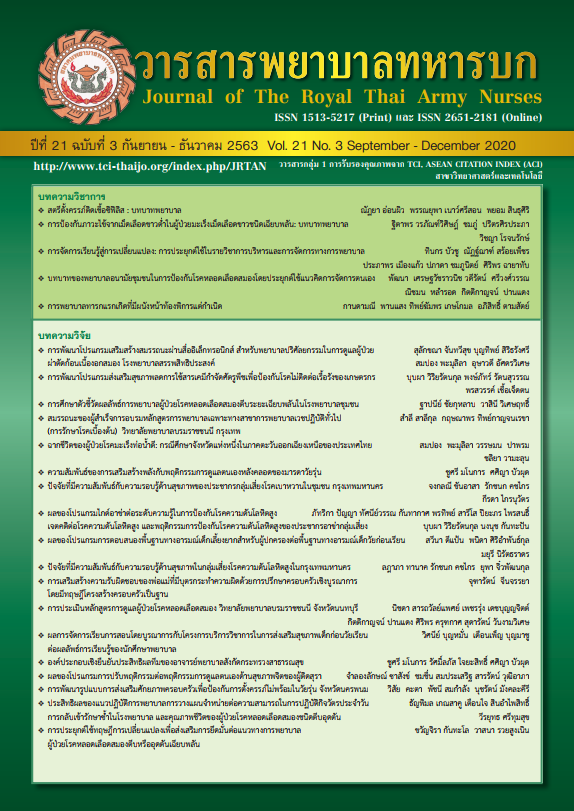The Effect of a Cognitive-Behavioral Therapy Program on The Aggressive Behaviors among Delinquent Adolescents in Observation and Protection Center
Keywords:
aggressive behaviors, delinquency adolescents, cognitive-behavioral therapy programAbstract
Aggression among delinquent adolescents in an observation and protection center may be caused by negative automatic thoughts, irrational thoughts, and the lack of important social skills. Helping these youths to reduce their aggression is important. This quasi-experimental research used a pretest-posttest control group design. The purpose of this study was to examine the effect of a cognitive-behavioral therapy program on the aggressive behaviors of delinquent adolescents in an observation and protection center. The samples were male adolescents in an observation and protection center, department of juvenile observation and protection in Bangkok and perimeter, aged 15-18 years. The 66 adolescents were divided into experimental and control groups, 33 adolescent in each group. The experimental group participated in the cognitive-behavioral therapy program for 6 weeks, 120 minutes on the 1st and the 6th week, and 60 minutes from the 2nd to the 5th week. The control group received the routine program of the observation and protection center. The research instruments consisted of the following: 1) personal information; 2) the cognitive-behavioral therapy program; and 3) an aggressive behavior scale. Data were analyzed using descriptive statistics and t-test.
The result found that: 1) after participating in the cognitive-behavioral therapy program, there was a significant decrease in the mean of the participants’ aggressive behavior scores (M = 32.81, SD=5.61) than before (M = 41.61, SD = 8.47) (t = 10.46, p<.001); and 2) there was a significant difference in the mean differences in the aggressive behavior scores between pretest and posttest intervention of the experimental group ( = 8.81, SD = 4.69) and control group (
= 2.27, SD = 1.07) (t = 7.80, p<.05).
The findings suggest that such a cognitive-behavioral program could be effective decreased and beneficial program for control aggressive behavior among adolescents in observation and protection centers, in the department of juvenile observation and protection.
Downloads
References
Santrock JW. Educational psychology. 5th ed. New York: McGraw-Hill; 2011.
Kumlerd S, Haenjohn J, Supwirapakorn W. Development of problem solving training program based on acceptace and commitment therapy in adolescents and young adults with amphetamine addiction. J Roral Thai Army Nurses. 2019; 20(1): 181–187. (in Thai)
Intraprasert S. The relationship between media influence and violent behavior of child and youth in Bangkok. SDU+Res J. 2014; 10(3): 17–36. (in Thai)
Kaewkaewpan W. Family relationships with problem of delinquency in adolescence. Veridian E-Journal, Silapakorn University. 2017. (in Thai)
Information technology center. Annual report 2018: case statistics. Bangkok: Department of juvenile observation and protection; 2018. (in Thai)
Nuampet U, Phanitrat R, Yutthatri P, Sitthiruk N. Relationships among negative life events, rumination, learned resourcefulness and psychiatric problems in juveniles with substance abuse in incarceration [dissertation]. Nakhornpathom: Mahidol Univertsity; 2011. (in Thai)
Wachirapraditporn O. Factors of juvenile delinquency and proactive remedial measures. Bangkok: Court of justice Thailand; 2012. (in Thai)
Seatang J, Yoelao D, Sringernyuang L, Padthaisong S. Anger in correctional context: An insider’s view. J Behav Sci. 2016; 22(1): 87–108. (in Thai)
Meepien D, Iamsupasit S. Suttiwan P. Effects of self-control training to reduce aggressive behaviors of female adolescent offenders in Ban Pranee juvenile vocational training center. Journal of Health Research. 2010; 24(1): 35-38. (in Thai)
Nayai U, Srisook W. The development of spiritual health activity model for children and youth in the juvenile observation and protection center of Pattani province [dissertation]. Songkla: Songkla University; 2017. (in Thai)
Meesuaisint M, Pathumcharoenwattana W, Boonprakob P. Development of a transformative learning process for enhancing authentic self-esteem of male violent juvenile del inquents [dissertat ion]. Bangkok: Chulalongkorn University; 2015. (in Thai)
Beck J.S. Cognitive behavior therapy: Basics and beyond. 2nd ed. New York: The Guilford Press; 2011.
Smeets K.C, Leeijen A.A.M, van der Molen M.J, Scheepers F.E, Buitelaar J.K, Rommelse N.N.J. Treatment moderators of cognitive behavior therapy to reduce aggressive behavior: a meta-analysis. Eur Child Adolesc Psychiatry. 2015; 24(3): 255–64.
Hoogsteder L.M, Stams G.J.J.M, Figge M.A, Changoe K, van Horn J.E, Hendriks J, et al. A meta-analysis of the effectiveness of individually oriented cognitive behavioral treatment (CBT) for severe aggressive behavior in adolescents. J Forensic Psychiatry Psychol. 2015; 26(1): 22–37.
Beck R, Fernandez E. Cognitive-behavioral therapy in the treatment of anger: a meta-analysis. Cognit Ther Res. 1998; 22(1): 63–74.
Payamongkon T, Worawutbuddhapongs P, Tapunya P. Effect of training program based on cognitive behavioral therapy on automatic negative thought and aggressive behavior of mathayom suksa 1 students [dissertation]. Chiangmai: Chiangmai University; 2009. (in Thai)
Sookasem T, Panyo U, Sukapanpotharam C, Hantrakul D. Relationship between child rearing practices, peer’s behavior, media, and aggressive behavior of secondary school students in Chiangmai province [dissertation]. Chiangmai: Chiangmai University; 2001. (in Thai)
Panliaw P, Soonthornchaiya R, Vuthiarpa S. The effects of a cognitive behavior therapy program on the aggressive behaviors among patients with amphetamine dependence. J Royal Thai Army Nurses. 2017; 18 Suppl 1: 207–214. (in Thai)
Westbrook, D., Kennerley, H. Kirk J. An introduction to cognitive behaviour therapy: skills and applications. London: Sage; 2007.
Parekitthammachai V. The effects of behavior modification to reduce aggressive behavior of adolescents at risk [dissertation]. Bangkok: Srinakharinwirot University; 2012. (in Thai)
Rabiab K, Lueboonthavachaail O, Thato R. The effect of muscle relaxation and anger control training program on aggressive behaviors in schizophrenic patients. J Psyhiatric Nurs Ment Heal. 2013; 27(2): 69–84. (in Thai)
Phuipha T. Bunthumporn N. Vuthiarpa S. The effect of a life-skill training program on the depressive symptoms of senior high school students. J Royal Thai Army Nurses. 2018; 19 Suppl: 89–98. (in Thai)
Kongsuwan V, Chanchong W. The effects ofviolence management skills training program for core-team high school youths in preventing aggressive behaviors. Songklanakarin J Soc Sci Humanit. 2014; 20(4): 73–105. (in Thai)
Downloads
Published
How to Cite
Issue
Section
License
บทความหรือข้อคิดเห็นใดใดที่ปรากฏในวารสารพยาบาลทหารบกเป็นวรรณกรรมของผู้เขียน ซึ่งบรรณาธิการหรือสมาคมพยาบาลทหารบก ไม่จำเป็นต้องเห็นด้วย
บทความที่ได้รับการตีพิมพ์เป็นลิขสิทธิ์ของวารสารพยาบาลทหารบก
The ideas and opinions expressed in the Journal of The Royal Thai Army Nurses are those of the authors and not necessarily those
of the editor or Royal Thai Army Nurses Association.






